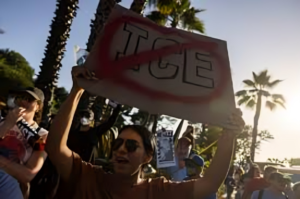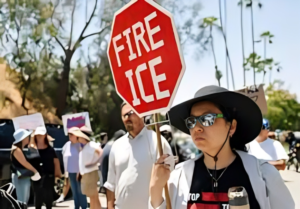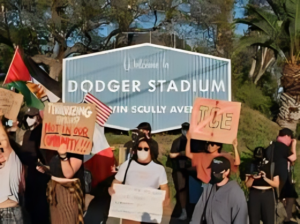Inside the Dodgers’ Stand: How LA’s Beloved Team Responded to ICE Raids
Introduction
In mid-June 2025, a wave of ICE raids swept across Los Angeles County, touching neighborhoods and workplaces from downtown to the suburbs. Tension ran high when federal agents reportedly attempted to enter Dodger Stadium’s parking lot on June 19, only to be turned away by stadium security and team representatives. Amid protests and mounting fear in immigrant communities, the Los Angeles Dodgers chose a path of solidarity—issuing a public statement, partnering with city officials and community organizations, and pledging $1 million to provide legal aid for affected individuals. This article explores how the Dodgers leveraged their platform to stand with their neighbors, demonstrating that baseball can be a powerful force for unity beyond the diamond.

LA Dodgers ICE response
Community at the Heart of Baseball Town
Los Angeles has always worn its identity as a city of immigrants with pride. From the vibrant Mexican-American communities of Boyle Heights to the Filipino enclaves of Historic Filipinotown, baseball has served as a unifying thread. When news broke that federal immigration agents were conducting sweeps in neighborhoods across the county, many feared that Dodger Stadium—an iconic gathering place—would become a flashpoint.
Protests at the Ballpark
- On the evening of June 19, hundreds of advocates and family members gathered outside the stadium gates, holding handmade signs reading “Somos Familia” and “Safe Harbor, Not Fear.”
- Security personnel maintained a respectful distance, allowing peaceful demonstration on city-owned property adjoining the venue.
- No arrests were reported at the stadium site, in part due to a clear agreement between Dodgers management and local law enforcement to avoid confrontations.
For many fans, the impromptu rally felt like an extension of the community events the team regularly hosts—albeit with a more urgent message: that fear and separation have no place in Los Angeles.
Building Bridges: The Dodgers’ Initiative
Recognizing their unique influence, the Dodgers moved swiftly to channel concern into action.
- Public Statement of Solidarity
- Team owner and front-office executives issued a joint letter expressing empathy for immigrant families and announcing a partnership with the City of Los Angeles’ Mayor’s Office on Immigrant Affairs.
- $1 Million Legal Fund
- Donations will underwrite free legal consultations, assistance with court filings, and “know-your-rights” workshops conducted in English and Spanish.
- Community Outreach Events
- Beginning July 1, the team will host weekly “Community Nights” at Chavez Ravine, offering complimentary tickets to families affected by the raids alongside resources tables staffed by nonprofit organizations.
Real-Life Story: Maria López, a longtime Dodger fan whose husband faced detention in Bell, shared, “When I received my Community Night ticket, I felt seen. It wasn’t just about baseball—it was about protecting our future.”

Behind the Scenes: Coordination and Support
Creating a rapid-response initiative of this scale required careful planning:
- City Collaboration: Dodgers leadership liaised with the Los Angeles Mayor’s Office to ensure funds were directed where they’d have maximum impact.
- Nonprofit Partnerships: Established legal aid groups such as the Legal Aid Foundation and the Immigrant Rights Alliance were chosen for their track record in deportation defense.
- Multilingual Communications: All materials—from press releases to social-media graphics—were produced in English, Spanish, Tagalog, and Mandarin, reflecting the city’s linguistic diversity.
This “all-hands” approach underscores how a sports franchise can marshal resources—marketing, legal, media outreach—to support vulnerable populations.
Conclusion
In an era when political polarization often seeps into public life, the Los Angeles Dodgers demonstrated that institutions rooted in community tradition can choose solidarity over silence. By combining visible support at Dodger Stadium with a substantial legal aid fund and ongoing outreach, the team reaffirmed its role as more than an entertainment entity—it’s a civic partner. As the city continues grappling with the fallout from federal immigration actions, the Dodgers’ example may inspire other organizations to step forward, ensuring that compassion plays ball in every corner of Los Angeles.